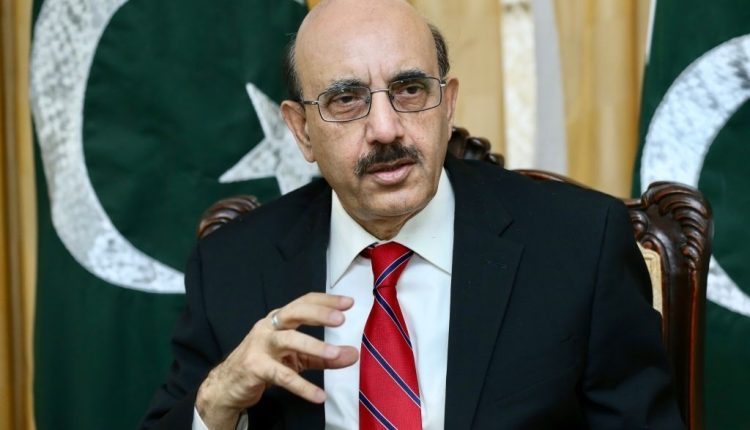Islamabad: Sardar Masood Khan, Pakistan’s former Ambassador to the United States, China, and the United Nations, and former President of Azad Jammu and Kashmir, as a Chief Guest delivered a comprehensive address on Pakistan’s strategic direction amid intensifying United States–China competition. Speaking at the BNU Centre for Policy Research alongside former National Security Advisor Dr. Moeed Yusuf and distinguished academics, Ambassador Khan articulated a forward-looking framework based on diplomacy, deterrence, development, and balanced geopolitical engagement.
Opening his remarks, Ambassador Khan congratulated Dr. Moeed Yusuf on assuming leadership of Beaconhouse National University and reflected on the dynamic shifts in global power politics. He noted that while Washington and Beijing remain rivals, they are simultaneously interdependent—economically, technologically, and strategically. “The world has never witnessed mutual dependence at this scale,” he observed, recalling how the West outsourced critical industries to China in the early 2000s, reshaping global markets through comparative advantage and supply-chain reorientation.
Ambassador Khan described China’s Belt and Road Initiative as “an economic pincer that has transformed strategic geography,” adding that China has quietly expanded influence across Europe, Latin America, Canada, and Australia, eroding long-held American preeminence. While dismissing predictions of a direct military confrontation between the two powers, he underscored that the post-World War II order is “frayed at the core,” in part due to U.S. policies, including President Donald Trump’s recalibration of alliances. “The world is in flux,” he said, “with China, Russia, and emerging powers exploring alternative models to a U.S.-led system.”
Turning to Pakistan, Ambassador Khan emphasized that the country today “enjoys a high diplomatic altitude after the May 2025 India – Pakistan war,” and that Pakistan’s global standing has strengthened militarily, politically, and diplomatically. He highlighted President Trump’s frequent public praise of Pakistan, calling it “unprecedented and strategically consequential.” Central to Pakistan’s foreign policy, he reiterated, is no binary choices between Beijing and Washington. “We must leverage our strategic location and economic geography,” he said, adding that Pakistan must engage all major regions — Central Asia, the Middle East, Europe, China, and the United States — through inclusivity, not exclusivity.
Discussing deterrence, Ambassador Khan called for maintaining “rock–solid, credible and nuclear capability,” coupled with conventional proportionality against India. He emphasized the need to develop comprehensive digital and cyber capacities. However, he cautioned that military strength alone cannot safeguard Pakistan: “Without social stability, Pakistan remains vulnerable. Political cohesion and national unity are indispensable to credible deterrence.”
Ambassador Khan lauded the Chinese Ambassador for reaffirming Beijing’s long-term commitment to CPEC, noting two major developments: the launch of CPEC 2.0 during the Prime Minister’s recent visit to Beijing, and the signing of $10 billion worth of new agreements — in addition to the original $62 billion. He described these reassurances as “a strong rebuttal to deliberate scepticism and disinformation about CPEC.”
On development, Ambassador Khan urged Pakistan to pursue structural reforms, export-led growth, tax modernization, and a sustained revival of tech-startup ecosystems. “We often look at Pakistan through tinted lenses and forget the invisible poor,” he said. He called for urgent reforms that ensure opportunity, education, and growth for all segments of society.
Revisiting Pakistan’s historic role as a bridge between China and the U.S. in the early 1970s, Ambassador Khan asserted that Pakistan can once again serve as “an economic and technological bridge” — not as a neutral bystander, but as a constructive partner to both superpowers. He reiterated that Pakistan needs the West — for trade, education, investment, and diaspora linkages — just as much as it needs China.
Addressing the persistent two-front challenge with India and Afghanistan, Ambassador Khan urged diplomatic efforts to reduce tensions. He stressed that Pakistan’s guiding strategy must remain consistent: engage all actors, avoid exclusive alignments, maintain credible deterrence, strengthen internal stability, and promote sustainable development.
In his concluding remarks, Ambassador Masood Khan delivered a clear and emphatic message: “Only Pakistan can bail out Pakistan. We must reclaim our self-confidence as a nation.” Drawing on his early years in China, he recounted the discipline and resolve that propelled China’s rise. “We need not copy their political model,” he said, “but we must emulate their discipline and development ethos.”
He added that China, too, wishes to see a strong Pakistan that stands on its own feet, not a nation reliant on bailouts. “Pakistan must conceive itself as a consequential country—one whose destiny is shaped by its own courage, clarity, and conviction.”
Ambassador Khan concluded by expressing gratitude to the organizers, congratulating the BNU Centre for Policy Research, and acknowledging the contributions of Ambassador Mansoor Ahmed Khan and Dr. Zainab Aiman in hosting a “timely and intellectually rich dialogue on Pakistan’s strategic future.” He also thanked Dr. Hassan Daud Butt, a former Naval officer and now a thought leader for his contributions to promote Pak – China relations.
THE DAILY COUNTRY NEWS IS ONE OF THE PAKISTAN'S LARGEST ENGLISH-LANGUAGE NEWSPAPER. COUNTRY NEWS IS REGULARLY SCHEDULED PUBLICATION CONTAINING NATIONAL AND INTERNATIONAL NEWS, HEALTH NEWS, ARTICLES,BLOGS, INFOTAINMENT, ADVERTISEMENT AND MUCH MORE.

